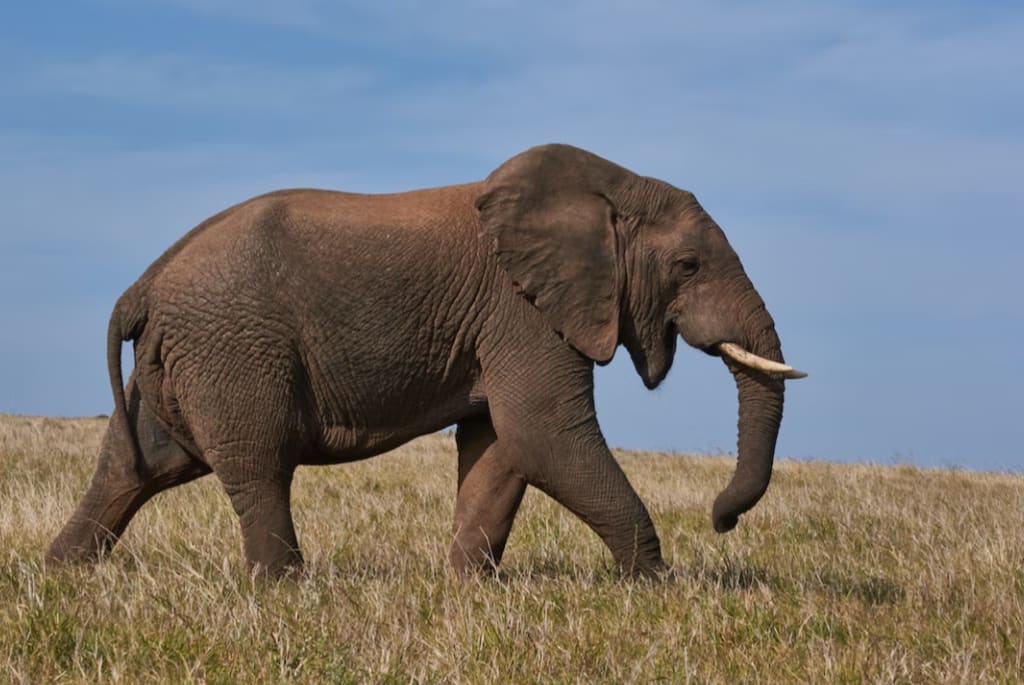
Did you know? Whether it is human or animal, the cells in the body are undergoing cancerous changes from time to time.
Doesn't it seem incredible? But what is even more incredible is that elephants do not get cancer.
Normal thinking implies that the larger the size of the animal, the greater the number of cells, taking the premise that the cells in the organism are bound to become cancerous, it should be that the greater the number of cells, the greater the probability of fission of cancer cells, but why does an elephant not get cancer? But why doesn't an elephant get cancer? It is so much bigger than a human.
Number of animal cells
Where do cancer cells come from?
It is well known that the human body has a large number and variety of cells, and these cells have to divide to continue to maintain body functions and to keep body organs working properly.
For example, the intestinal villi of the human body have a lifespan of only 2-3 days, but if they want to maintain the function of the intestine to absorb nutrients and eliminate residues, they have to keep on dividing and regenerating to maintain the work of the intestine.
However, in the process of cell fission or replication, there is no guarantee that this fission is a 100% copy of the genes of the original cell, and if a wrong replication occurs, it will cause the replicated cell to become bad, which is what we call cancer cells.
Generally speaking, when there are cells in the body that have been copied incorrectly, the cells themselves will conduct self-examination, and if there are minor problems, they can repair themselves, and if they cannot repair themselves, they will self-destruct, and they will never allow cancer cells to continue to fission.
This function of self-examination and self-cancellation is what we know as the self-immune system. Therefore, if there is a problem with this system, it is like a loophole in the firewall of a computer, and viruses and Trojan horses will take advantage of it, and cancer cells in the human body will continue to fission and form tumors under this loophole, and eventually spread to the whole body.
However, some mammals are extraordinarily maverick, and can even be said to be the Chosen Ones. They do not get cancer, and if not in the case of natural or man-made disasters, all will live to the end of their lives. Those are large animals like elephants and whales
Peto's paradox
In the field of biology, there is a paradox that has not been completely solved by scientists until now, and that is the Peto paradox.
Peto's paradox is that the same species has a higher probability of cancer than the smaller ones, but when compared across species, the larger species have a lower probability of cancer than the smaller ones. This means that the probability of cancer between species is not affected by the size of the species.
In 1977, the British immunologist and statistician Richard Peto, who was studying the probability of cancer, found a very strange phenomenon, that is, the incidence of cancer cells in the body of mice is much higher than that of humans, knowing that there are 1000 times more cells in the human body than mice, and similarly, humans are 3000 times smaller than blue whales, but the probability of developing cancer is higher than that of blue whales.
These statistics can only be taken as data at first, until the beginning of the investigation of human individual size and the probability of cancer, but found that the results are the opposite.
In 1998, a survey of 17,000 men and women was conducted in the UK, and the statistics found that the taller the person, the more likely they were to get cancer. In 2011, another survey was conducted on millions of women, and the conclusion was still that height is directly proportional to the chance of getting cancer.
Although the Peto paradox has existed for decades, it is a great challenge for scientists and a fascinating topic in biology.
In December 2021, Arizona researcher Carlo Maley, to highlight the impact of science on cancer in the tree of life, evaluated the cancer mortality rate of 191 species, totaling 110,000 individual animals in a zoo, and through a rigorous quantitative statistical approach, proved Peto's paradox while also concluding that species' body size and lifespan are accompanied by cancer-fighting mechanisms. The conclusion is that the body size and lifespan of species progress together with cancer-fighting mechanisms.
This statement can be interpreted as meaning that the larger the species is, the more advanced the cancer-fighting mechanisms it has evolved. With this explanation, a part of the Peto paradox thinking can be solved.
Carnivores are more likely to develop cancer
In this statistical investigation in 2021, to explore the Peto paradox in-depth and find anti-cancer clues from it, a large dataset of a zoological information management system was adopted to find anti-cancer answers by analyzing age, weight, sex, and pre-and post-mortem pathology data of non-domesticated mammals (e.g., wildlife parks).
In the process, a high risk of cancer in carnivores was identified, and it was also hypothesized that it was most likely related to progesterone or other contraceptive hormone pills because, in zoos, where the number of animals or their reproduction needs to be controlled, it is common to give contraception to animals.
But on contraceptive measures, female carnivores receive more than male carnivores, theoretically, it should be female carnivores have a greater probability of cancer, but both are carnivores, and the probability of cancer is similar regardless of sex, so this does not completely solve the Peto paradox.
In the next study, it was mentioned that 10%-20% of cancers are caused by viruses, and carnivores are more likely to be exposed to cancer-causing viruses than other mammals that eat little or no meat, especially those that eat mammals (such as tigers, lions, etc.), which have the highest chance of developing cancer. On the contrary, those mammals that eat plants are relatively less likely to develop cancer, such as ruminants (e.g. cattle, sheep, camels, etc.) have the lowest cancer risk among mammals.
Why elephants don't get cancer
The probability of cancer in elephants and humans has been compared, and the probability of death from cancer in elephants is less than 5%, while in contrast, the probability of death from cancer in humans is as high as 25%.
So where is the evolutionary mechanism of elephants advanced, and can humans learn from it?
The reason why elephants are so lucky is that there is a copy of an anti-cancer gene called TP53 in their genes, which is also known as the anti-cancer umbrella because of its ability to inhibit cancer. TP53 can block tumor genes, inhibit the growth of cancer cells, and repair cancer cells to stop the formation of tumors at the root.
TP53
This cell is also found in humans, but in very small numbers and the experiments conducted in 2021 concluded that the number of TP53 may be inextricably linked to diet and habits.
As we know, elephants are herbivores, feeding on leaves and fruits, which greatly eliminates the contamination of cancer cells or contaminated mutant cells from the meat of other mammals. This also preserves the activity of TP53 in the body to a great extent, so that the TP53 force in the body will concentrate on destroying the cancer cells formed by its cell division.
So why is the probability of cancer in whales also so low?
We can know from the elephant cancer situation that the reason why whales have a low probability of cancer is also inseparable from their diet, whales feed on all kinds of marine life and rarely come into contact with too many mammals, even those that do, such as fur seals, also feed on fish and do not eat as much as land predators, so the probability of cancer is also minimal.
This is why, the doctor the patient, eats more vegetables and fruits, fish, and less pork, not only because of the high fat and cholesterol meat but also because the meat of certain animals, the probability of cancer cell fission is greater.






Comments
There are no comments for this story
Be the first to respond and start the conversation.